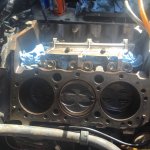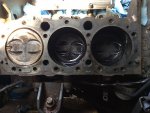Jacko40 hp
Recruit
- Joined
- Dec 3, 2019
- Messages
- 1
Hi everyone, so first time ever using a forum bit I’ve gathered useful information from them over the years. I’ve always been told and repeated if you don’t know ask and no question is a dumb question when you are asking for help.
I own a 2006 Honda 40hp Honda and it went in the saltwater, it never got fully submerged but enough to get water in the bottom pot. At the time the engine wasn’t running and it was in the water for about 10 minutes max before we got it above the water. The boat was immediately towed to shore, washed down with fresh water and the sparks plugs removed to drain the water while it was turned over by hand. When I got it home the oil was drained and oil filter replaced. I’m on a budget so I haven’t pulled to head off as I can’t afford to get the kit to rebuild it. With it all cleaned down and fully flushed, new oil etc she will wind over freely by hand. All electrics are ok and working perfectly. My concern is I haven’t been game enough to start it cause I’m afraid she might blow up. When looking into the spark plug ports I can see a rusty colour and am concerned the salt water has done damage and once she fires the end is nigh. I know i should be pulling the head and giving it a good once over but cash is the issue. Do you think it’s worth giving it a start or will I just do more damage.
Thanks
I own a 2006 Honda 40hp Honda and it went in the saltwater, it never got fully submerged but enough to get water in the bottom pot. At the time the engine wasn’t running and it was in the water for about 10 minutes max before we got it above the water. The boat was immediately towed to shore, washed down with fresh water and the sparks plugs removed to drain the water while it was turned over by hand. When I got it home the oil was drained and oil filter replaced. I’m on a budget so I haven’t pulled to head off as I can’t afford to get the kit to rebuild it. With it all cleaned down and fully flushed, new oil etc she will wind over freely by hand. All electrics are ok and working perfectly. My concern is I haven’t been game enough to start it cause I’m afraid she might blow up. When looking into the spark plug ports I can see a rusty colour and am concerned the salt water has done damage and once she fires the end is nigh. I know i should be pulling the head and giving it a good once over but cash is the issue. Do you think it’s worth giving it a start or will I just do more damage.
Thanks





















